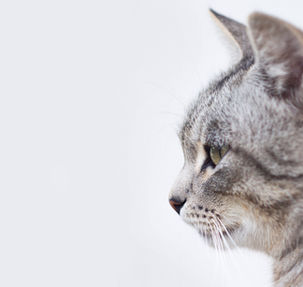
FAQ about Cats
Why do I need to vaccinate my kitten?
Kittens are temporarily protected against many diseases by antibodies received through their mother’s milk. These maternal antibodies decline in the first couple of months of their lives, however until they drop sufficiently they can also neutralise vaccines. For this reason a course of two vaccinations are necessary for a kitten, starting from 8 weeks of age. These vaccines will need to be given 3-4 weeks apart, protecting against feline panleucopenia, calicivirus and rhinotracheitis.
Call us today to book your kitten in!
Is it safe to have indoor plants around cats?
We all love our indoor jungles, but there are a few things to consider before purchasing your plant. There are some plants that are very toxic to cats if eaten.
Key indoor plants to AVOID:
- Snake plants
- Lilies
- Monsteras
Symptoms of plant toxicity:
- Vomiting
- Diarrhoea
- Breathing difficulties
- Drooling
- Difficulties swallowing
- Excessive drinking
- Frequent urination
- Overall weakness
- Irregular heartbeat
Can my cat eat dog food?
A regular diet of dog food can be extremely dangerous for your cat as it does not contain essential nutrients that your cat needs, such as taurine and arachidonic acid. Taurine deficiency can lead to blindness and arachidonic acid can lead to dry, scaly skin. If your cat has a habit of eating the dog’s food, try to feed your cat and dog in separate areas at the same time and remove any leftovers.
What about intestinal worms?
Intestinal worms are relatively common in many animals. Regular deworming is essential to ensure your pet remains healthy and to reduce the risk of some of these worms being transmitted to people.
Kittens sometimes arrive at their new owner’s home with worms already present.
What is Feline Aids? FIV?
Feline AIDS is a disease caused by infection with feline immunodeficiency virus (FIV) which affects the cat’s immune system. This disease is not transmissible to humans.
FIV is almost always transmitted by bites from infected cats. The virus that causes the disease is present in saliva.
While some infected cats show no sign of disease, others may display initial symptoms such as fever, loss of appetite, diarrhoea, lethargy and swollen lymph nodes.
As the disease progresses, other symptoms may occur such as weight loss, sores in and around the mouth, eye lesions, poor coat and chronic infections.
Eventually, the immune system becomes too weak to fight off other infections and diseases. As a result, the cat may die from one of these subsequent infections. Unfortunately in Australia, a lot of cats are infected with this virus.
Call us today to book your cat in for their FIV vaccination.
Will my cat have a reaction to the vaccination?
Following vaccination your cat may be off-colour for a day or two, or have some slight swelling or tenderness at the injection site. Access to food and water and a comfortable area to rest are usually all that is required for a quick recovery.
However, if the response seems more severe, you should contact us for advice.
Do I need to get my adult cat vaccinated?
The immunity from kitten vaccinations weakens over time and your cat can again become susceptible to disease. Annual health checks and booster vaccinations will provide the best protection for the life of your cat.
Call us to book your furry friend in today!
Do I need to use flea treatments?
Fleas can be very distressing for your pet, however they are more than just a nuisance. Fleas can cause skin disease and transmit infectious or parasitic diseases, some of which can be transmitted to humans.
The most common way pets pick up fleas is from the environment. Pets can pick up fleas from a exploring walk or even in the backyard!
You may be surprised to learn that adult fleas (the ones you see) make up only about 5% of the total population. The remaining 95% (eggs, larvae and pupae) are found in carpets and bedding - in fact anywhere in your house! Each female flea can lay up to 50 eggs per day so it doesn’t take long for an infestation to take hold, YUCK!
Come in and talk to our friendly staff about flea treatment options.
Caring for your cat while being pregnant.
It is true that some cats (especially those who actively hunt) carry a disease called toxoplasmosis, which can harm an unborn baby. Pregnant women can catch the disease from a variety of sources, including through accidentally swallowing the parasite through contact with cat faeces. However pregnant women can still own cats; they just need to be vigilant about washing their hands after close contact and avoid handling kitty litter.
Better yet, get your partner to do it!









